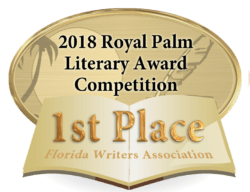
Jenny Ferns, a professional psychologist, knows the impact trauma can have on people. She uses this specialized knowledge to build character arcs and show the comprehensive impact on families in her stories. She also discovered through her own experience that writing memoir can be a therapeutic exercise. Using her memories from living in England for over twenty years, she created an authentic voice for her book, Ripple Effect, which won First Place for Unpublished Blended Genre in the 2018 Royal Palm Literary Awards. Jenny discusses how she utilizes her psychology knowledge to create realistic characters and switching from “pantsing” to plotting in this week’s showcase.
Jenny’s Writing Journey
I wrote because I had to in elementary school. The dreaded composition was given for homework at the weekend. I dreaded it, complaining I didn’t have any imagination. But I wrote about what I knew and imagination crept in. Writing was an integral part of education then. All exams were written, even science. No multiple choice.
As a professional, I always wrote: notes about clients, a thesis, articles for a magazine. I also wrote for personal therapeutic reasons. Writing helped me deal with personal issues and loss. I encouraged my clients to do the same.
When it came to writing my book, it began as a therapeutic exercise, as a memoir. I enjoyed the process of simply writing. Then I decided that fiction would be more fun and I could create a strong antagonist, characters, and disasters—free of my own family and possible repercussions.
I began writing by the seat of my pants, “pantsing.” Then I realized I wasn’t developing a clear plot or path of character growth, destruction, and change. I began to plan. I spent many hours writing character sketches and the backstory for each. That in itself solidified my writing skills and I got to know my characters. Once I wrote the actual document the characters came to life and took directions I did not expect. The creative process began.
The Winning Entry, Ripple Effect
Logline: An independent woman raised her dead sister’s child during WW II in England. Postwar, the ripple effect of wartime losses, wounds of the soul, secrets, and lies almost destroy her.
My brother’s story of his life in WWII England became the seed for my story. He said in his own words, “there must have been a lot of smoke and mirrors that obscured the truth.” The truth was murky about being adopted as a toddler by his aunt during the war. His biological mother, presumed killed by a bomb in the Blitz of London, turned up when he was eighteen.
I lived for twenty-two years in England after the war. The ripple effect of the war on my life, my brother’s life, and many in the military returning home, continued and continues years later. I wrote about this in a fictional story. The effects include alcoholism, family violence, a secret adoption, and secret affairs. The shame and secrets of the trauma of war affected the minds of combatants and non-combatants who often silently suffered with PTSD. I wrote about the effect on every member of a family.
I hope the story will resonate with others impacted by other wars even if the time and place differs.
Making the Story Authentic
I wrote about Britain with my English voice. This made it sound authentic. I made the characters believable, being familiar with places, habits (tea time and crumpets), speech patterns, and British personalities from the upper crust to working class. I knew from experience, my parents, and research how people lived and survived during and after the war. For example, the government supplied all children with milk, cod liver oil (yuk), and orange juice to ensure the new generation grew strong after the war’s deprivation. I only liked the orange juice. The milk was served warm at school recess. Refrigeration was not universal then.
As a professional psychologist I know, intimately, the impact of trauma on people. In the story I show the paths of destruction for all members of a family, not just the combatant. I also show the path of change and hope for healing for everyone in a family.
Read an excerpt of Ripple Effect here
Two Truths and a Lie, Writer’s Edition
Anyone can give good feedback.
Be consistent with point of view.
Show and not tell.
Which is the lie? Anyone can give good feedback. Not true. I joined a critique group. I learned to be humble. First drafts of a scene I thought were perfect. Why not? Didn’t I write well? Not always. I found I was far from perfect. I learned and grew with helpful feedback from others. Find someone to give an anonymous critique. That’s why I entered the Royal Palm Literary Awards competition. I wanted to get the rubrics. Be sure to be consistent with point of view. Don’t head hop from one person’s thoughts to another. Also, show and don’t tell. Being in the moment with a character and showing the action and emotion as it impacts that person makes the writing vivid and the character believable.
Other Works by Ferns
I wrote a master’s thesis which is unreadable to anyone not in the counseling business. I also wrote a piece about relationships and staying in love for a self-help magazine in Canada. In addition, I wrote a small e-book about marketing and publishing and a few e-zines about a home business and online marketing.
Close to my heart now is a children’s fairy story, Princess Rose and The Wyldewoods. This is a creative endeavor after taking a rest from my novel. My mind needed to stay active.
Coming Next for Jenny
I am writing a sequel to the novel Ripple Effect: You Can Run, But You Can’t Hide is the working title. I am also writing a sequel to the fairy story, Princess Rose: Magic or Medicine?
Connect
You can connect with Jenny and learn more at jennyfernswriter.com and follow her Facebook page at www.facebook.com/jenny.ferns.
More About RPLA
The Royal Palm Literary Awards competition is a service of the Florida Writers Association established to recognize excellence in members’ published and unpublished works while providing objective and constructive written assessments for all entrants. Judges include literary agents, publishers, film producers, current or retired professors, teachers, librarians, editors, bestselling and award-winning authors, and journalists from across the nation. Entries are scored against the criteria set by RPLA using rubrics tailored to each genre. Winners are announced at the annual FWA conference during the RPLA awards banquet. To learn more about RPLA, click here for the guidelines.


Gloria Perna
I just finished reading chapter 18 of Ripple Effect and so want to read this book. I really enjoy this type of story ( historic fiction) I hope it gets published soon. I would love to have this as a book for our book club.
Arielle Haughee
Wasn’t it great! I am looking forward to when it comes out, too!